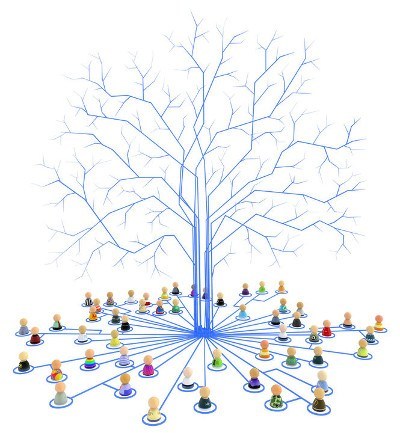Welcome to the Open2Flow blog
This Open Blog section is for longer blogs and is open to registered users. To prevent misuse (spamming, hackers) registered users should initiallly use the Submit a Blog facility (in User Menu) - after review you are changed to 'author'
- Details
- Written by Francois Knuchel
- Hits: 13372
Organisational Culture: Embodied Learning in a New Simulation
- “An experience that is fun, challenging and like nothing I've done before! Would recommend to anyone who wants a fresh perspective on organisation culture.”
- “An excellent immersion into culture norms and behaviours providing physical, emotional and psychological insights into the impact of these on the humans that work in them”
- Details
- Written by Francois Knuchel
- Hits: 3149
Massive collaborative self-organised learning experience
Experience: Massive Collaborative Self-organised Learning with Theory U
From Ego to Eco: Transforming Business, Society, and Self
Recently I was among 15,000+ 'change makers' from 180 countries who participated in a large MOOC (Massive Open Online Course) learning experiment initiated by MIT's (Massachusetts Institute of Technology) Professor Otto Scharmer, author of 'Theory U' and 'Leading from the Emergent Future, From Ego-System to Eco-System Economics'.
- Details
- Written by Francois Knuchel
- Hits: 16174
Why do Organisations need more trained Facilitators?
Many companies suffer from a lack of cohesion and connectedness. Managers and staff alike generally lack a holistic view of their organisation in terms of its internal flow of energy and value creation. Most people in organisations do not have a full view of what goes on across the organisation, and the executives at the top may have an overview of the various departments, but generally have little understanding of what the issues are at the shop floor level. First published in Medium 6 May 2019
First published in Medium 6 May 2019
This lack of a multi-disciplinary and holistic view of their own organisation is manifest
- Details
- Written by Francois Knuchel
- Hits: 3099
Do Organisational Change Mandates Work?
It has been my contention for a long time that one of the reasons change mandates experience a 60%-80% failure rate (depending on definition, metrics etc) is not because there is anything wrong with the new system or working practice an organisation is implementing, nor because of poor communication or persuasion skills of the executives or consultants charged with the intervention, but rather very simply because the employees affected are often not asked nor consulted in the matter. They are simply informed of the changes as a fait accompli, they are not invited to co-create the future of the organisation. This in turns leads to disengagement, disenchantment or even cynicism, which can create a block in the change being implemented.
- Details
- Written by Francois Knuchel
- Hits: 14283
ASK, THEN INVITE TO CO-CREATE CHANGE!
First published in Medium 21 December 2015
Have you ever been in an organisation where you were good at your job, efficient and productive, satisfied by what you achieved, hopeful about future prospects, respected in your expertise, and really feeling part of a good team? ……. and then all of a sudden, one day, out of the blue, you are told that some changes were going to happen; ……. and that a that a team of consultants were coming in to bring about these changes and introduce a new system (SAP, agile, lean………). This team then devotes time and energy explaining the purpose of the change, the why and how, and it all makes perfect logical sense, indeed the proposed changes are not dissimilar to changes you had proposed to your manager in the past. And yet, despite not disagreeing with the reasons for the change, your heart feels crushed, you somehow feel totally betrayed, utterly let down, completely undermined, leaving you shattered and dispirited.
- Details
- Written by Administrator Webmaster
- Hits: 3174
What is 'Open Space'?
Guest blog by Martin Grimshaw
Open Space Technology, commonly Open Space, is a social technology, a tool for helping people to rally around a shared challenge, with minimum obstacles and maximum efficiency. It is used to organise large meetings, gatherings, conferences, problem solving and summits in which everyone has the opportunity to participate on their own terms.
Open Space is nothing new. The process was developed by Harrison Owen in the 1980's and it has been applied countless thousands of times, in at least 135 countries, in a variety of ways, with groups of just a few people to several thousands, from hours to several days, and longer. However, the basic process and principles perhaps reach back into ancient human history.
- Details
- Written by Francois Knuchel
- Hits: 9775
Is Hierarchy Toxic?
Nowadays discussions about hierarchy abound, especially in organisations, some arguing you need hierarchy to run an organisation, otherwise you have chaos, while others deploring the negative effects of hierarchy, such as stifling innovation, or treating humans as mechanical cogs. These debates have come to the fore with the advent of self-organising structures, self-managing organisations and more recently the hubbub around companies without bosses, networks without hierarchies, and so on.
There is no doubt that militaristic hierarchy can be toxic, especially when fostering independent creativity, innovation and autonomous problem-solving, (and I’m fully aligned with those who have a natural aversion to hierarchy as it is often applied.) Yet it seems to me just abolishing hierarchy, as many movements are trying to do, is somewhat misguided, missing the point, throwing the baby out with the bathwater.
- Details
- Written by Francois Knuchel
- Hits: 3555
Kaizen - rejuvenating your organisation
"A journey of a thousand miles begins with a single step." (Lao Tsu)
What does Kaizen mean?
Kaizen means different things to different people. Some see Kaizen as part of the Toyota Production System, or the essence of Lean. Some have positioned Kaizen as the umbrella concept of Lean or Six Sigma. Others viewa it merely as a set of techniques or practices. Meanwhile, it is also seen as a leadership style or culture. Toyota see it as the "soul of the company". To me Kaizen is a pan-organisational attitude and questioning mind-set, which fosters co-creative betterment.
- Details
- Written by Francois Knuchel
- Hits: 7042
BEYOND BUURTZORG?
Interesting next stage organisation seeking investment through community shares
A novel type of social care organisation emerging in the UK incorporating many of the teal and new economy principles under one platform holistically
While this health and care organisation I’m presenting here follows many of the self-organisation principles found in the successful Dutch nursing care organisation Buurtzorg, well known to followers of Reinventing Organisations and new ways of working, this one takes everything a step beyond! Primarily it is set up as a platform cooperative. A platform cooperative is like an Uber or AirBnB, but owned and controlled by its drivers/passengers or home owners/travellers rather than by the software company. In this case both carers as well as those being cared for are all co-owners. The organisation is appropriately named Equal Care Co-op.
- Details
- Written by Francois Knuchel
- Hits: 3215
The Problem with Change Management
As coach I have always steered away from "change management", even though it is a huge industry and I would have done quite well in it. Intuitively change management has always struck me unfair or oppressive, even when it was well-intentioned and perfectly rational. It has appeared to me one-sided, with senior management wanting to enforce a new system or a new way of working, yet were often unwilling to change their own habits or behaviours. I even felt that when I myself was a 'senior manager! 'Change management' gives an air of blame. injecting fear, and when things are not working it's "because the staff are incompetent, or lazy, or otherwise doing things wrong – they need to change". It is not a genuinely collaborative effort.
Page 1 of 2







